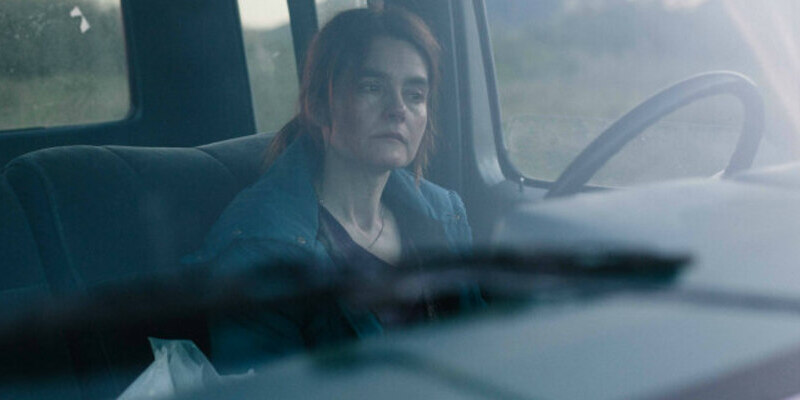
Review by
Benjamin Poole
Directed by: Kathleen Hepburn
Starring: Shirley Henderson, Théodore Pellerin, Mary
Galloway, Nicholas Campbell

Never Steady, Never Still, an imposing debut from writer/director Kathleen Hepburn, opens
with the expressive tableaux of its lead (Judy, played by
Shirley ‘whispering’ Henderson) wading fully clothed into an
ocean which seems to have the shade and heft of the very same oil which is
drilled further upstate of this bleak Canadian setting. As her white
nightdress spreads out about her in soaked folds, Judy is placed in an
artistic tradition of doomed heroines; Ophelia drowning among the flowers,
the life-imitates-art example of Virginia Woolf stuffing her pockets with
stones before being swallowed up by the Ouse River, Chopin’s Edna wandering
into the Gulf; ‘the touch of the sea is sensuous, enfolding the body in its
soft, close embrace.’ The image is iconic of a particularly feminine form of
suffering and release, and sets the tone for this sad, quiet drama which
focuses on a family living with Parkinson’s disease in the hollow tundras of
north-eastern Alberta.

Prior to Never Steady, Never Still, Hepburn’s film credits were composed of photographic duties, a rich
training ground that pays dividends in this directorial role. The film is
shot handsomely, with imagination and a devastating eye for local beauty
that nevertheless still honours the social realism verisimilitude of the
narrative. Hepburn inserts us in scenes as she shoots characters in
conversation from behind, as if we’re eavesdropping as Judy and her lovely
husband, Ed (Nicholas Campbell), cope with the ins and outs of her
affliction. It’s the little things that Hepburn homes in on, like Judy being
unable to remove a ring or to do up her trousers, the sort of actions that
the abled bodied take for granted, but which here require intimate support.
Henderson has always been the sort of actress you want to sit down with a
nice warm blanket and give a hug to at the best of times; here she exudes
her usual fragility and is terrific in this committed performance. So, it’s
a real kick in the teeth when poor old Ed has a heart attack as he’s out
fishing, leaving Judy to fend for herself, and also cope with their
twenty-something son Jamie (Théodore Pellerin), who, it runs out,
could be homosexual, an issue which he is having severe trouble coming to
terms with - yikes!

It’s no comedy, is Never Steady, Never Still. But while the heart-breaking subtlety of Judy and Ed’s relationship gets
under the skin, the trials and tribulations of gay Jamie seem transplanted
from another film and serve to over egg the gloom. Is there a contrast to be
forged between a character who is afflicted with a physical disease that
affects her nervous system and makes her body a prison, and a sexual
preference which causes a character to disguise who he is to fit in? Poor
old Jamie, working in the none-more-homoerotic oil fields of Alberta: all
those thrusting pistons, the pounded holes, all that grease. He doesn’t know
whether he’s coming or going! It’s a tough gig, and, perhaps because of his
home life, Jamie isn’t much of a sunny side up lad as it is; in a very
telling moment, he recounts in laboured voiceover this utterly horrible
childhood story about his poor dog coming a cropper against a porcupine. Why
is the story included? It has nothing to do with being gay, nowt to do with
Parkinson’s either, yet here it is, sound-tracking Jamie’s workday. It’s
just a glib aside to remind us that life can be utterly horrific and sad at
times, which we sort of got anyway.

Never Steady, Never Still was a festival favourite and it
isn’t difficult to see why; the cinematography (by Norm Li) is
something else and the performances are universally superb. But, just as the
exciting and showy couture of a Milan catwalk is suited to an exhibition of
fashionistas yet rarely translates to high street fashion, not often does
the meditative histrionics of a film like
Never Steady, Never Still thrive outside the institutional
convergence of a festival. Never Steady, Never Still's title refers to the convulsing presentations of Judy’s disease, but it
contradicts the staid, reflective pace of Hepburn’s film which too often
emotionally overwhelms when it could gently affect.

Never Steady, Never Still is on MUBI
UK now.
